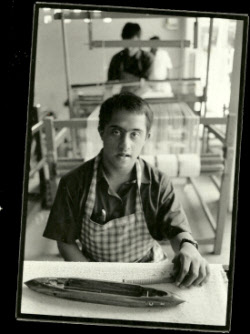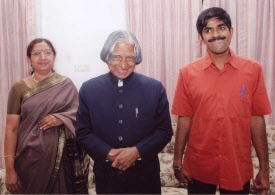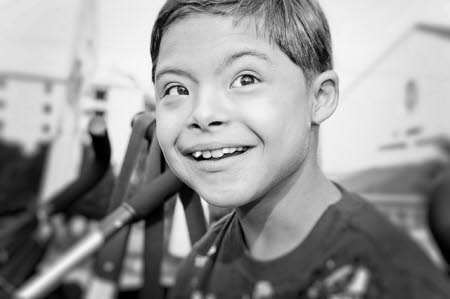When Ramesh Sundar was born, his mother, Lakshmi Sundar did not know how dramatically her life would change its course after that. On the 11th of February 1984, the doctor scribbled the word ‘Mongol’ with a question mark on the baby’s birth record. She also told Sundar to come and meet her with the kid after five years. The reason: unlike other babies, Ramesh hadn’t cried the instant he was born.
At about three years, the boy was still on fluids and was talking mono-syllables. He had just begun to walk thanks to physiotherapy. It was only then that Ramesh’s parents figured out their second son was a special child, a Down’s syndrome baby. Sundar, a special educator now, admits that she was very upset when she came to know of her son’s condition. But the determination in her made her act fast. Today, Ramesh is a swimming champion and is skilled at weaving. He earns his own income.
Niranjan Ravi, now 25, was diagnosed with autism when he was five. Ramamani Ravi, a law graduate and a Chartered Accountant, is a proud mother today. Niranjan is a sportsperson and a good human being, she beams. “As per the norms, he has completed 12th standard in the National Open School with the help of a scribe”, she adds. He also works at an office now, a measure aimed at providing as much time as possible for him to spend with others and be nurtured by it.
Ask her what steps she took to help her son overcome autistic features and she says modestly that there was not much she had to teach him, in the true sense of the word. “I had to just ensure that he was provided with adequate opportunities to learn, and also make the surroundings congenial for him to learn, keeping in mind his sensory issues,” she says.
I had to just ensure that he was provided with adequate opportunities to learn, and also make the surroundings congenial for him to learn.
Bringing up and dealing with a special child is not easy. It truly demands tremendous patience from the part of parents at each and every step of their child’s life – be it learning something academic or learning behaviour or picking up a sport or a vocation. What does teaching and learning mean when it comes to such children? One thing is clear: it’s not about pure academics. Learning for them is more about learning what’s essential for basic living; it’s about socializing, communicating and behaving well and anything that helps in achieving holistic development. Mental developmental disabilities cannot be cured. But when put into the right kind of learning environment, the quality of such children’s lives can no doubt improve tremendously.
Socializing, Communicating and Behaving Well
So how does one teach differently-abled children how to distinguish good behaviour from the bad? Ravi, who is also the Treasurer of Muscular Dystrophy Association, mentions that with Niranjan, her main policy is “what he should not do anywhere, he will not do at any time.” The key tool she used to teach him what’s good and what’s bad was exposure, to be with others and learn what is appreciated and what is not, what others do and what they don’t, how they eat, how they behave, etc. “Role modeling helps at all times, whether inside the house or outside,” she adds.
The other – and of course, important – step is to put special children into a normal school. When he was about four,

Ramesh was sent to a regular school as part of an initiative to develop his socializing skills. “He spent two years each in lower and upper kindergarten and first standard. It was indeed a challenging time for me, with my son slowly progressing from one stage to the next,” recalls Sundar, a coordinator with the DS Special Children Welfare Association, Chennai – a parents support group that helps Down’s and Mentally Retarded adults earn their own money through vocation. Ravi too feels that it is important that special children attend a regular school. Niranjan attended Gujarati Vidyalaya in Chennai for three years. “Inclusion need not be for academics alone, but can be merely for learning behaviour. All this cannot be taught across the table,” she opines. However, according to her, regular schools are still not so open to the idea of taking in special children.
Academics Play a Role Too
All said and done, the need for academics cannot be ruled out altogether. Niranjan completed his 12th standard under the National Niranjan Ravi and his mother Ramamani Ravi with Former President Dr.A.P.J.Abdul Kalam. Picture Courtesy : Ramamani Ravi Institute of Open Schooling, in 2009. When he studied 10th, he was trained for it at Swabodhini, a school for Special Children in Chennai. However, in 2007, when he started working, he undertook private tuitions. According to Ravi, he wrote the exams taking two exams at a time. “I had to prepare the whole syllabus as flash cards, work sheets and computer material for it to reach him,” she says.
It always helps to have some basics in place but challenges exist here too. Sundar maintains that it still continues to be a challenge to engage Ramesh in academics. “He is not an academically inclined person and frowns if he is asked to get his notebook,” she reveals. Yet, she has made sure that he gets to know some important things. The exercise began when Ramesh was fourteen. She used flash cards with words like “Stop”, “Push”, “Pull”, “Go”, “Danger” written on them in block letters using bright colours. “I made him learn the words by repeatedly flashing the cards before him,” she adds. Today, he can relate to them as images with a certain meaning in his mind, she says, but never as meaningful words.
Sundar has even taught Ramesh to write his name, house address, and phone number. Not just that, she uses different techniques for him to identify and write the names of his family members. Whether it is match-the-name-to-the relationship or fill-up-the-blanks with the name or just reproducing the names five times, Ramesh can easily do it now, thanks to the tireless efforts of his mother. His writing assignments also include jargon specific to weaving because Ramesh is very passionate about the vocation.
According to Kripa Ganesan, an M.Ed in Special Education and a special educator at the Samarpan Centre for Autism Spectrum Disorders, Mumbai, functional academics are more important than pure academics. Functional academics would involve sight reading of words the individual would require to use in daily life. It also involves functional math, for example, understanding calendar, time, weights, measurements, value counting, etc. Functional academics would cover all the basic concepts required by the individual to perform vocational activities.
The Importance of Physical Training and Vocation
It is best to complement academics with physical education and vocational training. Says Ravi, “It is like a balanced diet, wherein we need all the nutrients in a given proportion. (In the case of autistic children), their potential or interest in other areas can be used to bring out better communication, socialization and behaviour. That was why I tapped Niranjan’s interest in games, outings etc to enable him improve on the above skills. My focus was not for him to excel in any game but to get an opportunity to learn these skills.” He has tried everything from swimming to skating to horse riding.
According to Ganesan, physical training helps individuals with autism in many ways. Activities such as cycling, skating, hurdle crossing, swimming, etc., help improve balance and co-ordination and also are a constructive way for such children to release their energy, thus improving their attention and concentration.
Sundar puts forth an interesting point in the context of physical activity. Ramesh, who is a trained swimmer and a swimming champion, swims almost every day. He also plays badminton or table tennis or cycles during some evenings with his physical trainer. That’s because Sundar is particular about putting him on an exercise regimen. “Down’s syndrome children grow weak at a very young age,” she reasons, “It is important to keep them on their toes.”
As far as vocational training is concerned, it really helps those children who are not academically inclined. “When our children at DS Special Children Welfare Association engage in different vocations to produce numerous products, thereby earning their own income, it helps them gain a sense of accomplishment,” feels Sundar. Ganesan concurs. “Vocational training is undoubtedly the most important for a special child. It is what is going to give the individual a feeling of independence, a sense of responsibility and is going to make him or her, a productive member of society,” she says.
So how does one choose a vocation for a special individual? Ganesan feels that it is important to choose the right vocation keeping in mind the ability and interest of the person. “Once the adult is trained in a particular vocation, he or she is going to spend a large part of his or her time in a vocational centre or a sheltered workshop. Vocational training should start by 16 years of age, when the child is given training in different activities. By the age of 20 years, a particular vocation that is best suited to the child’s interest and ability, can be chosen from amongst the ones he or she was trained in.”
Ramesh is very passionate about weaving. He has an exclusive loom for himself at his home. “It is a vocation he picked up very quickly when it was introduced in the special school that he studied at during his younger years,” Sundar recalls. Today, with his mother’s assistance, Ramesh manufactures hand towels, floor swabs, kitchen towels, door mats, and yoga mats with his skilled hands. Not just that, they get sold out so fast and the proceeds are fully his!
Therapies Play a Key Role Too
Therapies also play an important role in the overall development of children with mental disabilities. It is encouraging to note that special schools today are equipping themselves to provide different kinds of therapies. Therapies are useful in achieving a wide range of objectives in special children ranging from enhancing social skills and functional communication to improving participation in day-to-day activities to altering problematic behaviour to improving speech. Ganesan talks about the different therapies that special children are usually offered and what techniques are used in these therapies. (See boxed item in pg 35).
Education therapy, occupational therapy, behaviour therapy and relaxation therapy are some of the techniques that Sankalp, the open school & the learning centre, Chennai, has listed in its website, as part of its curriculum for autistic children. Mathru Mandir, Chennai, which is a special school for Down”s Syndrome children, offers speech therapy, vocational therapy, occupational therapy and physiotherapy.
In fact, music, dance and theatre are increasingly being used as therapeutic tools in the holistic development of special children. Says Anita Ratnam, dancer, choreographer and founder director of Arangham, a dance and theatre company, “I feel that every human being must be exposed to music and dance in some way; either through songs, voice, or instruments. Differently abled children, particularly Down’s syndrome children, benefit enormously from dance and movement therapy”, she points out. “Music and dance develop concentration, co-ordination, memory and motor skills which could normally be very difficult to instill in regular therapy sessions.”
Parents Play an Important Role
The bottom line is that in educating special children in all respects, early intervention is extremely important and this has to be backed with right training from the right professionals and solid support at home. The overall growth of the special child is the combined effort of special educators, therapists and parent support groups, together with the unstinted love, support and patience of parents.
Says Ganesan, “It is important for special schools to have parent training and enrichment programmes to ensure that parents follow up regularly at home.
It is imperative that parents work with the child so that there is enough repetition and practice in learning a new skill or behaviour.”
Whatever one would like to teach such a child, it should come with the understanding that the process is slow, very slow. Like Ravi points out, “It took a lot of time and I have learnt in the process how to help my son better.” She stresses on how crucial a role parents of special children play in the moulding of their children’s lives. “It was not by choice that I became the mother of Niranjan. This applies to all those who are special parents,” she says. According to her, acceptance is the key. “Acceptance at every stage of the child’s life is needed. We have to accept him, not with sorrow or as a curse on us, but that he is different from others, that he is a wonderful, distinct person,” she adds.

“It is primarily our duty as a parent that we have to perform diligently and in the process whoever be the child, the reformation happens. I am reminded of the ‘Carrot, Egg and Coffee Bean’ story. When each of these is boiled in water the same way for 10 minutes, there is a transformation. The carrot becomes soft and ready to crush. The egg becomes hard outside and different inside. The coffee bean does not change its form but changes the water that boils it. When given a special child, instead of crumbling like the carrot, or becoming unapproachable and hard like the egg, I chose to be the coffee bean,” she concludes.
If you would like to read more on Mrs.Ravi’s writings on Autism, please visit her website http://blogs.jambav.com/ramamani/
DS Special Children Welfare Association will be happy to hear from you for suggestions/donations.
They can be reached at 91-44-23760640 or at dsscwa@hotmail.com
Samarpan Centre for Autism spectrum Disorders website : www.sopan.org
Picture by Rich Johnson and Lance Nellson under CC license
